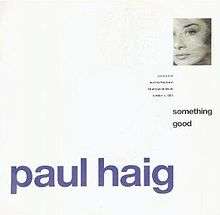Something Good (Paul Haig song)
"Something Good" is a single by Paul Haig, released in 1989 on Virgin Records subsidiary, Circa. As with the companion album, Chain, Haig financed the recordings himself hoping for a release by Les Disques Du Crepuscule. When Crepuscule passed, Circa stepped in.
| "Something Good" | ||||
|---|---|---|---|---|
 | ||||
| Single by Paul Haig | ||||
| from the album Chain | ||||
| Released | 1989 | |||
| Recorded | 1988 | |||
| Genre | Synthpop | |||
| Label | Circa Records | |||
| Songwriter(s) | Paul Haig | |||
| Producer(s) | Paul Haig, Alan Rankine | |||
| Paul Haig singles chronology | ||||
| ||||
"Something Good", as well as the album, was co-produced by ex-Associates instrumentalist Alan Rankine.
Various formats included extra tracks, such as the two instrumentals "Free to Go (Public)" and "Free to Go (Technology)", which both included samples from Ridley Scott's film, Blade Runner.
Sleeves again feature the Angus McBean portrait of Audrey Hepburn.
Track listing
- "Something Good"
- "Over You"
- "Free to Go (Technology)"
- "Free to Go (Public)"
- "Something Good" (Remix)
- "The Last Kiss"

Something Good (remix), UK 12" Sleeve
gollark: It's easy to say that if you are just vaguely considering that, running it through the relatively unhurried processes of philosophizing™, that sort of thing. But probably less so if it's actually being turned over to emotion and such, because broadly speaking people reaaaallly don't want to die.
gollark: Am I better at resisting peer pressure than other people: well, I'd *like* to think so, but so would probably everyone else ever.
gollark: Anyway, I have, I think, reasonably strong "no genocide" ethics. But I don't know if, in a situation where everyone seemed implicitly/explicitly okay with helping with genocides, and where I feared that I would be punished if I either didn't help in some way or didn't appear supportive of helping, I would actually stick to this, since I don't think I've ever been in an environment with those sorts of pressures.
gollark: Maybe I should try arbitrarily increasing the confusion via recursion.
gollark: If people are randomly assigned (after initial mental development and such) to an environment where they're much more likely to do bad things, and one where they aren't, then it seems unreasonable to call people who are otherwise the same worse from being in the likely-to-do-bad-things environment.I suppose you could argue that how "good" you are is more about the change in probability between environments/the probability of a given real world environment being one which causes you to do bad things. But we can't check those with current technology.
References
This article is issued from Wikipedia. The text is licensed under Creative Commons - Attribution - Sharealike. Additional terms may apply for the media files.